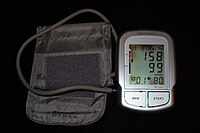
Photo from wikipedia
The exponential increase of metabolic syndrome and its association with the risk impact of morbidity and mortality has propitiated the development of tools to diagnose this syndrome early. This work… Click to show full abstract
The exponential increase of metabolic syndrome and its association with the risk impact of morbidity and mortality has propitiated the development of tools to diagnose this syndrome early. This work presents a model that is based on prognostic variables to classify Mexicans with metabolic syndrome without blood screening applying machine and deep learning. The data that were used in this study contain health parameters related to anthropometric measurements, dietary information, smoking habit, alcohol consumption, quality of sleep, and physical activity from 2289 participants of the Mexico City Tlalpan 2020 cohort. We use accuracy, balanced accuracy, positive predictive value, and negative predictive value criteria to evaluate the performance and validate different models. The models were separated by gender due to the shared features and different habits. Finally, the highest performance model in women found that the most relevant features were: waist circumference, age, body mass index, waist to height ratio, height, sleepy manner that is associated with snoring, dietary habits related with coffee, cola soda, whole milk, and Oaxaca cheese and diastolic and systolic blood pressure. Men’s features were similar to women’s; the variations were in dietary habits, especially in relation to coffee, cola soda, flavored sweetened water, and corn tortilla consumption. The positive predictive value obtained was 84.7% for women and 92.29% for men. With these models, we offer a tool that supports Mexicans to prevent metabolic syndrome by gender; it also lays the foundation for monitoring the patient and recommending change habits.
Journal Title: Applied Sciences
Year Published: 2021
Link to full text (if available)
Share on Social Media: Sign Up to like & get
recommendations!